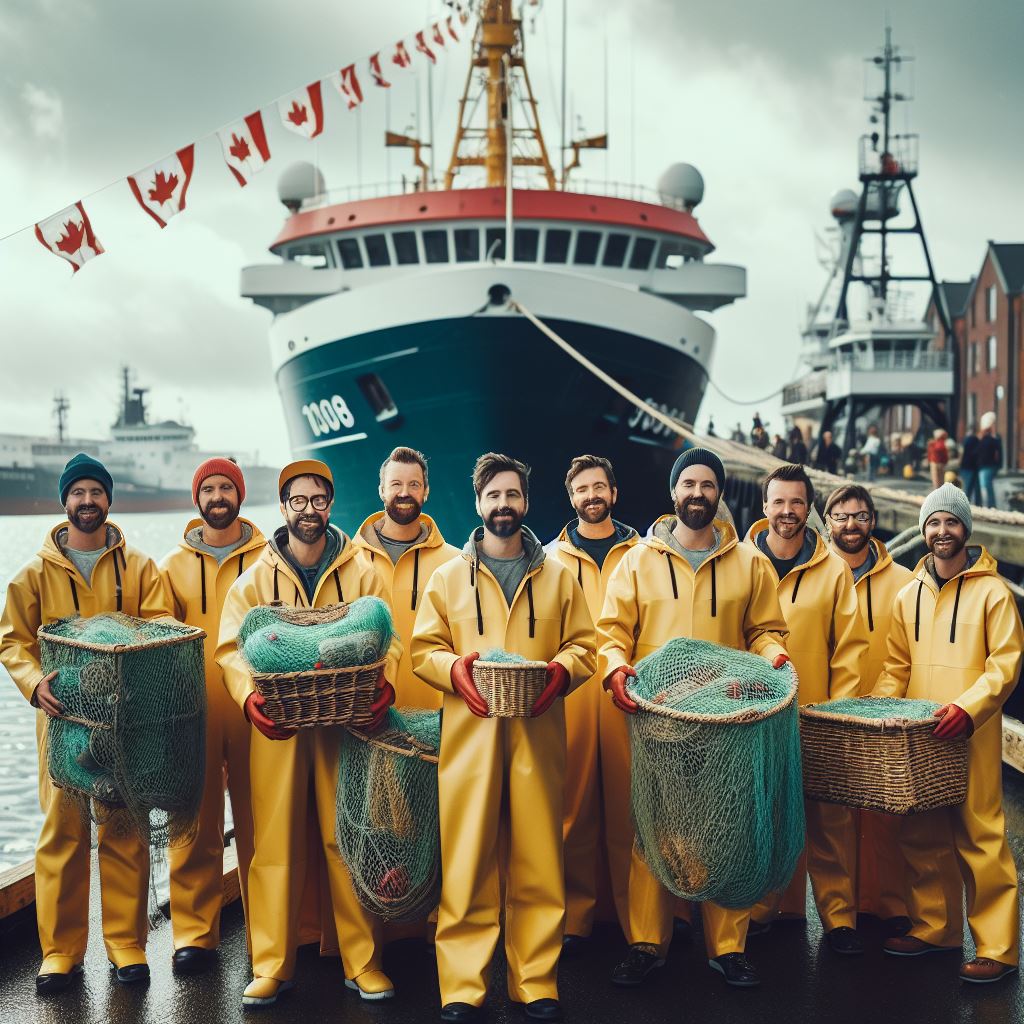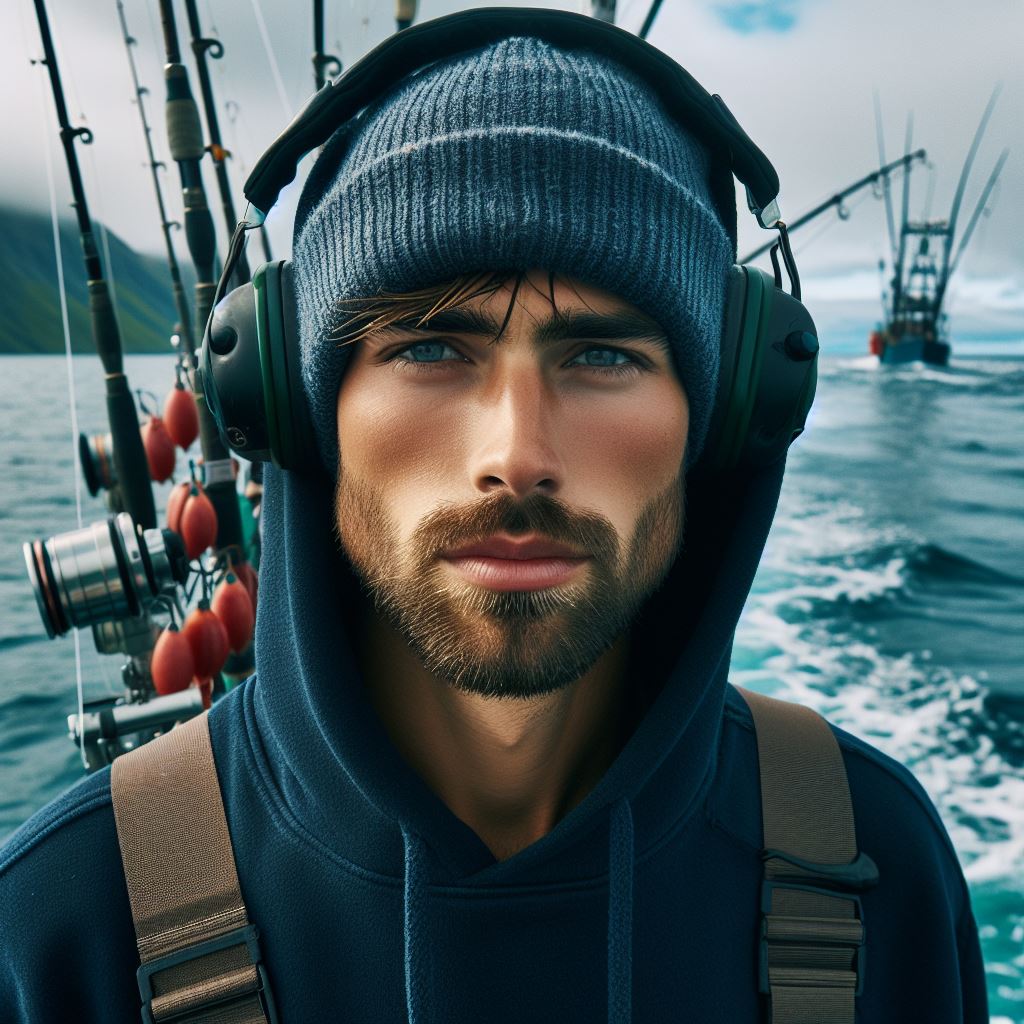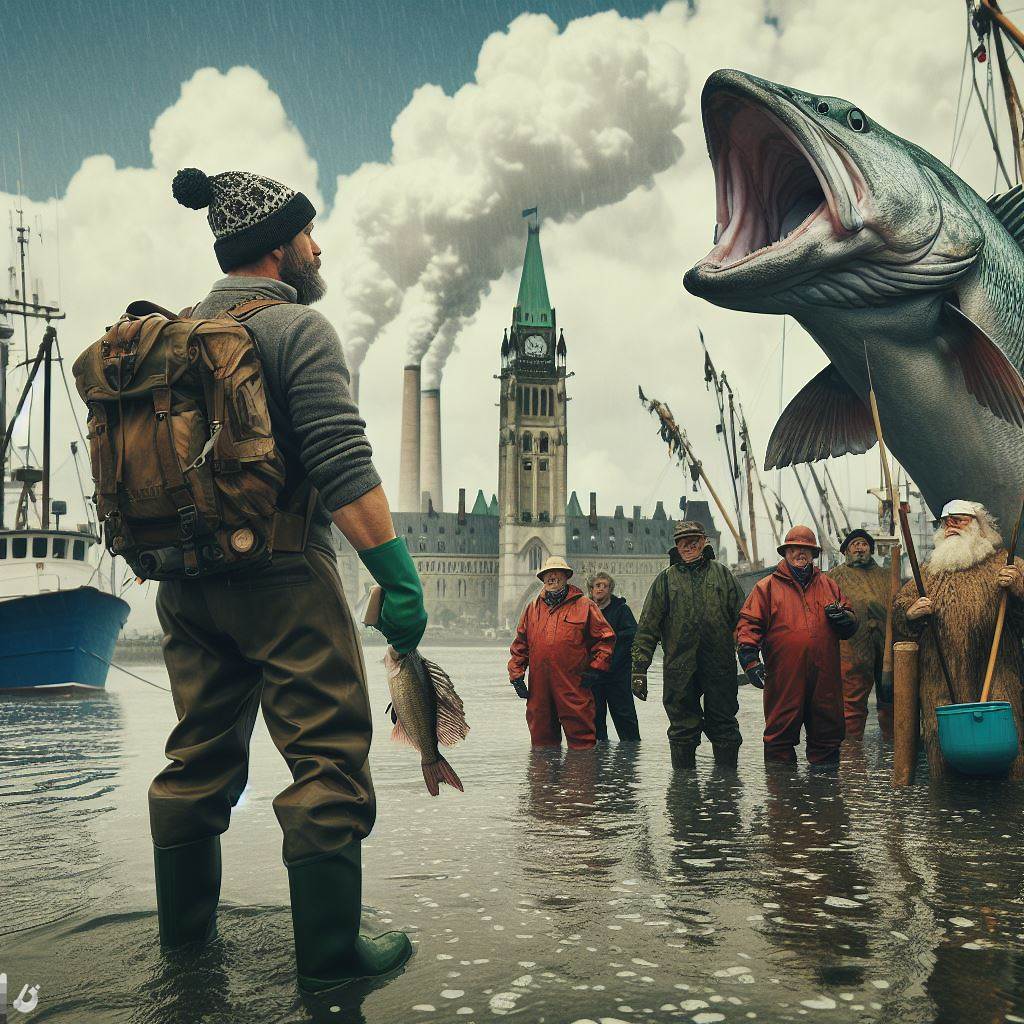Introduction
Let’s explore Career Paths in Canada’s Fishing Industry.
Brief overview of the fishing industry in Canada
The fishing industry in Canada is a vital sector for the country’s economy and communities.
It provides employment opportunities and contributes to the growth and development of coastal areas.
With its vast coastline and abundant marine resources, Canada has a thriving fishing industry.
Fish and seafood are not only important for the country’s domestic consumption but also for export, making it an essential economic driver.
Importance of the industry for the country’s economy and communities
Additionally, the industry plays a significant role in the cultural heritage and identity of many coastal communities.
It supports both small-scale and large-scale operations, providing career paths for individuals interested in various aspects of the fishing industry.
From commercial fishing and aquaculture to fish processing and marine biology, there are diverse job opportunities available.
Careers in the fishing industry can be fulfilling and rewarding for those passionate about the ocean and marine life.
Furthermore, the industry offers opportunities for growth and advancement, as technological advancements and sustainable practices continue to shape the sector.
As Canada’s fishing industry continues to evolve and adapt to changing environmental and economic conditions, it remains a crucial component of the country’s economy and a source of pride for many communities.
Types of Careers in the Fishing Industry
The fishing industry in Canada offers a diverse range of career paths.
Here are the different types of careers available:
Fish Harvesting
Fish harvesting involves the actual catching of fish.
There are various roles within this category:
- Commercial fishermen: These individuals are involved in catching fish on a commercial scale. They work on fishing vessels and capture fish for sale and distribution.
- Sports fishermen: Unlike commercial fishermen, sports fishermen catch fish for recreational purposes. They engage in fishing as a hobby or for sport, often practicing catch and release.
- Recreational fishermen: Similar to sports fishermen, recreational fishermen also fish for leisure and relaxation. They may fish from shore or in freshwater bodies, such as lakes or rivers.
Fisheries Management
Fisheries management focuses on maintaining sustainable fish populations and regulating fishing activities.
Several career options fall under this category:
- Fisheries officers: These professionals enforce fishing regulations and ensure fishermen comply with fishing laws. They monitor fishing activities, conduct inspections, and enforce penalties for non-compliance.
- Fishery managers: Fishery managers oversee the management and sustainability of fish stocks. They develop fishing strategies, set catch limits, and implement conservation measures to protect fish populations.
- Biologists and researchers: Biologists and researchers study fish populations, their habitats, and the impact of fishing on ecosystems. They conduct scientific research to inform fisheries management decisions and conservation efforts.
Seafood Processing
Seafood processing involves the preparation and packaging of fish for consumption.
Careers in this field include:
- Fish processors: Fish processors handle and process captured fish. They clean, fillet, and package the fish to prepare them for distribution and sale.
- Quality control technicians: Quality control technicians ensure that seafood products meet quality standards. They perform inspections, tests, and monitor processing procedures to ensure the seafood is safe for consumption.
- Seafood inspectors: Seafood inspectors work in processing facilities and monitor compliance with food safety regulations. They inspect the processing operations and facilities to ensure proper handling, storage, and sanitation practices.
Aquaculture
Aquaculture involves the cultivation and farming of fish, shellfish, and aquatic plants in controlled environments.
Careers in aquaculture include:
- Aquaculture farmers: Aquaculture farmers raise fish, shellfish, and aquatic plants in tanks, ponds, or marine enclosures. They manage feeding, breeding, and harvesting to produce seafood for commercial sale.
- Hatchery workers: Hatchery workers oversee the breeding and hatching of fish eggs. They maintain optimal conditions for egg incubation and care for the young fish until they are ready for stocking or sale.
- Aquaculture technicians: Aquaculture technicians provide technical support in maintaining aquaculture systems. They monitor water quality, assist with feeding and disease control, and help ensure the health and well-being of farmed fish.
These are just a few examples of the career paths available in Canada’s fishing industry.
Each role contributes to the sustainable management and growth of the industry, ensuring a steady supply of fish and seafood for consumers.
Whether you enjoy being out on the water, conducting research, or working in seafood processing, there is a career in the fishing industry that suits your interests and skills.
Read: Wildlife Protection in Logging Practices
Unlock Your Career Potential
Visualize a clear path to success with our tailored Career Consulting service. Personalized insights in just 1-3 days.
Get StartedRequired Skills and Qualifications
To pursue a successful career in Canada’s fishing industry, specific skills and qualifications are essential.
Depending on the chosen career path within the industry, different areas of expertise may be required.
Fish Harvesting
- Physical fitness is crucial for individuals involved in fish harvesting. This demanding work requires strength and stamina to handle heavy equipment and endure long hours at sea.
- Navigation skills are essential for fish harvesters to safely navigate through water bodies, locate fish populations, and avoid hazards.
- Previous fishing experience is advantageous as it provides practical knowledge and understanding of fishing techniques, equipment handling, and fish behavior.
Fisheries Management
- In fisheries management, having knowledge of marine species is vital. Understanding the life cycles, habitats, and behavior of various species helps in effective resource management.
- Research and analytical skills are necessary to collect and analyze data on fish populations, habitat conditions, and the impact of human activities on marine ecosystems.
- Familiarity with fisheries laws and regulations is crucial to ensure compliance with legal requirements and contribute to sustainable fishing practices.
Seafood Processing
- Attention to detail is critical when processing seafood to ensure quality control and meet industry standards. This includes proper cleaning, cutting, and packaging techniques.
- Food safety training is essential to maintain hygiene standards and prevent contamination during seafood processing. Knowledge of proper handling and storage practices is crucial.
- Manual dexterity is required to handle delicate seafood products and operate processing equipment safely and efficiently.
Aquaculture
- Knowledge of different fish species and their specific requirements is vital in aquaculture. Understanding their feeding habits, growth patterns, and environmental needs is crucial for successful farming.
- Familiarity with farming techniques, such as feeding, breeding, and disease prevention, plays a significant role in maintaining healthy fish populations in aquaculture operations.
- An understanding of environmental sustainability is necessary for aquaculture professionals to minimize the negative impact on surrounding ecosystems and ensure long-term viability.
These are some of the key skills and qualifications required for various career paths within Canada’s fishing industry.
Aspiring individuals should acquire the necessary knowledge and experience in their chosen field to thrive in this dynamic industry.
Continuous learning and staying updated with technological advancements and industry practices are also important for career advancement.
Read: Sustainable Practices in Canadian Farms

Education and Training
When it comes to pursuing a career in Canada’s fishing industry, acquiring the necessary education and training is crucial.
Different sectors within the industry require specific skills and knowledge, and various pathways can be taken to enter these fields.
Fish Harvesting
Fish harvesting involves capturing fish from bodies of water, a physically demanding and skilled occupation.
To become a fish harvester, individuals often need fishing certifications and licenses, which demonstrate their knowledge of fishing techniques, safety protocols, and regulations.
Additionally, apprenticeships and on-the-job training provide hands-on experience and further develop essential skills for this profession.
Fisheries Management
Fisheries management focuses on the conservation and sustainable use of fishery resources.
Professionals in this field need a comprehensive understanding of fisheries biology, ecology, and resource management.
A bachelor’s degree in fisheries or a related field, such as marine biology or environmental science, is typically required.
Additionally, obtaining professional certifications and participating in training programs can enhance knowledge and improve career prospects in this area.
Seafood Processing
Seafood processing involves the transformation of raw fish into marketable products.
Professionals in this sector ensure the safety and quality of seafood while following strict food handling and processing regulations.
On-the-job training is common in seafood processing facilities, as workers learn various processing techniques and gain a thorough understanding of food safety protocols.
Additionally, individuals can pursue certifications related to quality control and seafood inspection to enhance their credentials.
Aquaculture
Aquaculture refers to the farming of aquatic organisms, such as fish, shellfish, and seaweed.
A specific set of skills and knowledge is necessary to excel in this field.
Individuals interested in aquaculture can pursue an aquaculture-specific diploma or degree program, which provides in-depth knowledge of fish farming techniques, aquatic ecology, and business management.
Hands-on experience through internships or apprenticeships further enhance practical skills and provide valuable industry connections.
Therefore, education and training are essential for individuals looking to pursue diverse career paths in Canada’s fishing industry.
Whether one chooses to become a fish harvester, fisheries manager, seafood processor, or aquaculture professional, acquiring the necessary qualifications and skills will set them up for success in this rewarding industry.
By obtaining certifications, engaging in on-the-job training, and pursuing relevant degree programs, individuals can develop the expertise needed to thrive in their chosen career path within the fishing industry.
Read: Navigating Fishing Regulations in Canada
Opportunities and Challenges in the Fishing Industry
Abundance of Job Opportunities in Coastal Communities
- The fishing industry in Canada offers a wide range of employment opportunities for individuals living in coastal communities.
- Jobs in the fishing industry include fisher, deckhand, seafood processors, boat captains, and marine biologists.
- These jobs not only contribute to the local economy but also provide employment stability for coastal residents.
- Many fishing communities heavily depend on the industry for their livelihood, making it a vital part of their economic ecosystem.
Seasonal Nature of the Industry and Reliance on Weather Conditions
- The fishing industry is highly seasonal, with specific fishing seasons for different species of fish.
- Fishers are dependent on favorable weather conditions for a successful catch and safe operations.
- Unpredictable weather patterns and harsh sea conditions can greatly impact the industry’s productivity and profitability.
- During the off-season, fishers may engage in other activities or take up alternative employment opportunities.
Environmentally Sustainable Practices and the Push for Conservation
- The fishing industry in Canada has taken significant steps towards implementing sustainable practices.
- Regulations and quotas are in place to ensure the responsible and sustainable harvesting of fish stocks.
- The industry is increasingly adopting practices such as selective fishing and using more environmentally friendly gear.
- There is a growing emphasis on protecting delicate marine ecosystems and reducing bycatch and habitat destruction.
Technological Advancements and Their Impact on the Sector
- Technological advancements have revolutionized the fishing industry, improving efficiency and productivity.
- Many fishing vessels are now equipped with advanced sonar systems, navigation equipment, and fish finders.
- Automated processing plants have also streamlined the seafood production process, reducing labor-intensive tasks.
- While technology has increased efficiency, it has also raised concerns about potential job losses and the impact on traditional fishing practices.
Overall, the fishing industry in Canada presents abundant job opportunities for coastal communities.
However, it is also faced with challenges due to its seasonal nature, reliance on weather conditions, and the necessity of adopting environmentally sustainable practices.
Technological advancements have greatly impacted the sector, making it more efficient but also raising concerns about job security and the preservation of traditional fishing practices.
Despite these challenges, the fishing industry remains an integral part of Canada’s coastal communities and plays a vital role in their economic development.
Read: Modern Equipment in Canadian Logging
Conclusion
Diverse career paths await in Canada’s thriving fishing industry.
Explore opportunities such as:
- Commercial fishing roles
- Aquaculture management positions
- Fisheries research and conservation jobs
These paths promise fulfilling and dynamic careers, aligning with the industry’s sustainable and innovative future.
Whether you’re drawn to the adrenaline of the open sea or the scientific exploration of aquatic ecosystems, Canada’s fishing sector offers a spectrum of possibilities.
As the industry continues to evolve, embracing technology and ecological responsibility, individuals seeking rewarding professions will find ample avenues within the multifaceted world of Canadian fisheries.
From hands-on roles to those steering the industry towards a more sustainable future, the diverse career landscape ensures that passion and dedication find a place within the rich tapestry of Canada’s fishing sector.




